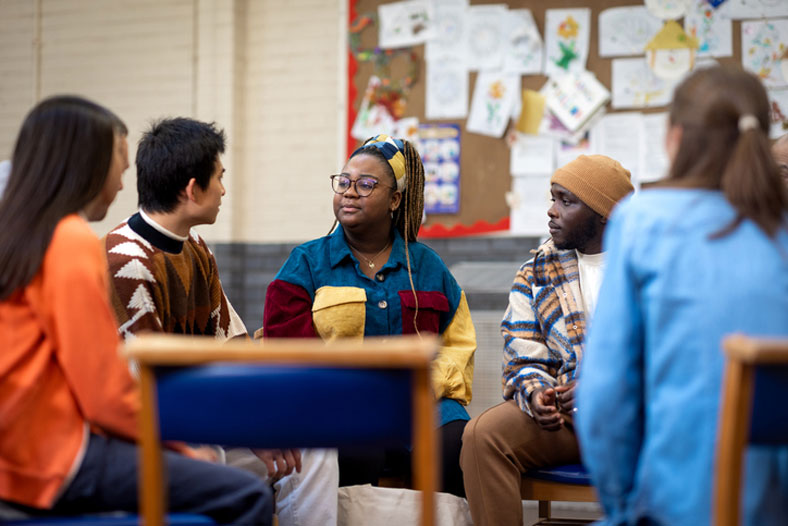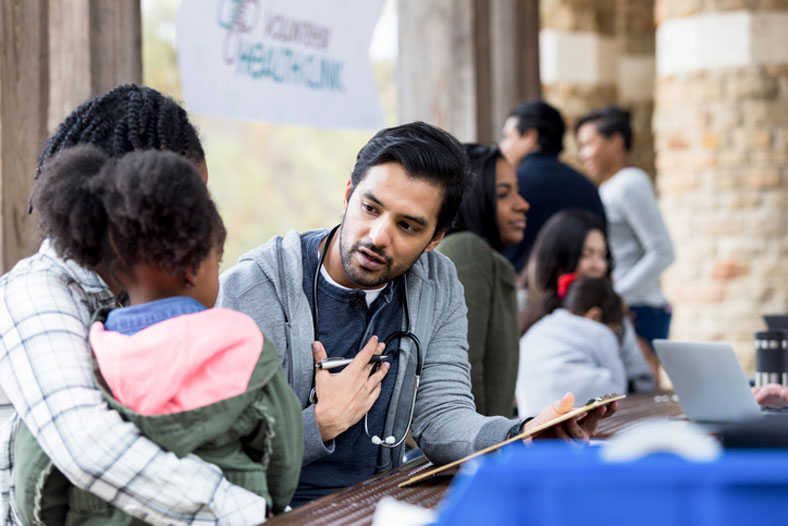Written by Jack Levinson

Social workers can provide invaluable support to those in need, joining the frontlines of our nation’s greatest causes to improve people’s lives. For those living in North Carolina who wish to make a difference in their communities, there’s no better career path than that of a social worker.
Taking on the full responsibilities of the social work profession requires a Master of Social Work (MSW) degree, which will prepare you for the complex duties you’ll take on in your career.
The Job of a Social Worker
Social workers are involved in a tremendous number of civic issues, from supporting individuals dealing with personal issues to helping communities improve their public services. There is no one-size-fits-all career path for social workers, but rather, a host of opportunities that can suit individuals with a variety of talents and dispositions.
In some cases, social workers act as first responders, helping individuals and families gain control over their circumstances. In others, social workers help organize efforts toward broader-scale change. The work you do as a social worker will depend on your own strengths and the causes that speak to you. Wherever you land, you will have the opportunity to use your abilities to make the world a better place.
What is an MSW?
A Master’s in Social Work is the required credential for those who wish to take on the full responsibilities of a social worker. MSW programs are designed to develop the skills needed to support others during critical situations. From managing a one-on-one clinical practice to understanding the social, political, and historical factors that inform a community’s struggles, an MSW will provide you with the training you need to meaningfully and competently assist others in need.
Requirements to Apply for an MSW
In order to apply for an MSW degree, one must already hold a bachelor’s in any subject. Many who pursue MSWs have academic backgrounds in psychology, sociology, history, and political science, all of which are relevant to the study of social work as a discipline.
Those who do not yet hold a bachelor’s but feel certain they would like to pursue social work may be enticed by a Bachelor of Social Work (BSW), which includes much of the foundational coursework included in an MSW program. While a BSW alone will not qualify you for the full-fledged responsibilities of a social worker, it can qualify you for an accelerated track in your MSW, allowing you to become a practicing social worker more quickly than any other academic route.
Types of MSW Degrees

There are a variety of MSW degree options in North Carolina that are designed to accommodate students with a range of personal requirements and professional goals.
Whatever your needs, you should be able to find an MSW program in North Carolina that fits into the rest of your life.
The three primary MSW degree types are the following:
Traditional MSW Programs (2-Year)
Traditional Master’s of Social Work Programs last two years and operate on full-time schedules. These are typically designed for in-person classroom settings and consist of a year of foundational coursework followed by a year of specialized study, in which students will choose their Master of Social Work focus area and take steps toward planning their future career. Traditional MSW programs also typically feature a practicum or internship component, in which students perform fieldwork to gain an orientation in their specific career path.
Accelerated MSW Programs (1-Year)
Those who already hold a Bachelor of Social Work are eligible for accelerated MSW programs, also known as Advanced Standing MSWs, which are full-time degree programs that condense coursework into a single year. This is because they bypass a significant amount of the foundational coursework of a traditional MSW, which those who hold a BSW will already have covered during their undergraduate education. Only those with a Bachelor of Social Work are qualified for Advanced Standing MSWs.
Clinical MSW Programs (2-3 Years)
Some social work professions, especially those involving direct counseling and especially sensitive causes, require practitioners to become licensed clinicians. These professionals are called Licensed Clinical Social Workers, also known as LCSWs. Clinical MSW programs typically involve the same coursework as a traditional program with extended time for rigorous field study that will allow one to thoroughly develop their abilities as a clinician.
Dual Degree MSWs
The MSW program options listed above are the most common degree offerings for MSW candidates. However, there are additional options available in North Carolina for those with even more unique goals. Dual Degree MSWS are multidisciplinary programs that are designed for those who would like to pair their study of social work with other fields that will be relevant to their practices. Popular options to combine with an MSW degree include Public Health and Juris Doctor (J.D.) degrees.
Online Social Work Masters Degree Programs
If your employment or family responsibilities are too great to imagine taking on the rigorous coursework of a traditional in-person MSW program, fear not.
It’s never been easier to pursue your Master of Social Work on your own terms thanks to the arrival of online MSW programs.
Online MSWs feature the same coursework as traditional two-year programs but allow students increased flexibility. While traditional in-person programs can cause great upheaval to individuals’ schedules, requiring commuting time and even in some cases relocating to be closer to one’s chosen academic institution, online programs allow you to work from wherever is convenient. They frequently include night-time and weekend classes to accommodate the schedules of those who work full-time. Some online options are also available part-time, meaning they will take longer than two years to complete but allow students the time to maintain their employment or attend to their family responsibilities.
If you are considering pursuing your MSW online, it’s worth noting that you will still be expected to complete fieldwork in person. This is because fieldwork and internship opportunities provide critical hands-on knowledge of the social work profession, and are an indispensable part of your social work training. However, many online MSW programs allow you to complete your fieldwork close to home, allowing you to design a schedule that will fit into the rest of your life.

Degree Specializations
As mentioned above, social workers are invested in a wide range of causes, providing an assortment of critical services to diverse populations.
Different social workers have vastly different skills and insights, which means it’s always possible to find a concentration that works for you.
Degree specializations for social workers in North Carolina can include the following topics:
- Mental health support
- Addiction and substance abuse recovery
- Employment assistance
- Immigration services
- Forensic social work
- Healthcare
- Gerontology and elder care
- In-school support
- Veterans’ causes
Some social workers choose to focus on issues close to their own experience, bringing their personal experience to the table to provide an empathetic ear to those in need. Others are moved to get involved in causes that aren’t connected to their own pasts but contribute to positive good. Whatever you are called to do, your efforts as a social worker will make a positive contribution in the lives of individuals and families as well as to society at large.
Field Education
Are you eager to get involved with social work but daunted by the thought of completing your MSW first? Good news: a typical MSW program includes a fieldwork or practicum component that will allow you to gain work experience before you graduate. Indeed, understanding the day-to-day responsibilities of a social worker are a crucial part of an MSW education. They can also be a terrific way of finding mentorship to guide you specifically toward your personal career goals.
The fieldwork you take on in your MSW is likely to overlap with your chosen area of focus. This will allow you to gain the skills most needed in your desired area of work.
Social work organizations throughout North Carolina are equipped to incorporate MSW students into their ranks. This system is mutually beneficial: aspiring social workers gain hands-on experience and skill-building, while social work organizations get more boots on the ground to carry out their functions.
FAQs
Do I need to hold a Bachelor of Social Work in order to qualify for a Master of Social Work degree?
No. Many who choose to become social workers decide to pursue their MSW after they’ve already received their bachelor’s degree, meaning social workers can enter the field from any academic background. BSWs are ideal for students who know at the outset of their undergraduate education that they would like to ultimately become social workers, as this degree will qualify them for Advanced Standing (accelerated) MSWs, allowing them to hit the ground running more quickly than those in a traditional MSW program.
How do social workers choose their area of concentration?
Every student determines their social work focus area in their own way. Some students know what type of work they’d like to do before even beginning their MSW, while others wait to complete their foundational coursework to decide what’s right for them. Some students choose to work within their own communities or on causes that have affected them directly, while others choose to pursue work unrelated to their own histories. There is no right or wrong way to choose your path in the world of social work. What matters is that you choose work that will be engaging and fulfilling for you in the long term, so that you remain committed and efficient in your work.
Do those who graduate with an MSW automatically become Licensed Clinical Social Workers (LCSWs)?
No. An LCSW has greater responsibilities than a non-licensed social worker, as they are the only social work professionals authorized to perform clinical work such as counseling and other direct therapeutic services. Obtaining one’s license typically involves more rigorous fieldwork than a traditional MSW, lasting longer than the traditional two-year MSW model. In North Carolina, LCSW also typically involves rigorous testing administered by the National Association of Social Workers (NASW). Be sure to look into these requirements as you plan your course to become an LCSW.
Is it possible to become an LCSW after obtaining an MSW?
Yes. In fact, many social work professionals choose to obtain their licensing after several years of working in the field with an MSW. Some choose to do this purely so that they can start their careers more quickly, while others wish to develop their understanding of the profession as a whole before taking on more advanced work. Whatever your reason, it will certainly be possible to become an LCSW even if you have already completed your Master of Social Work program.





